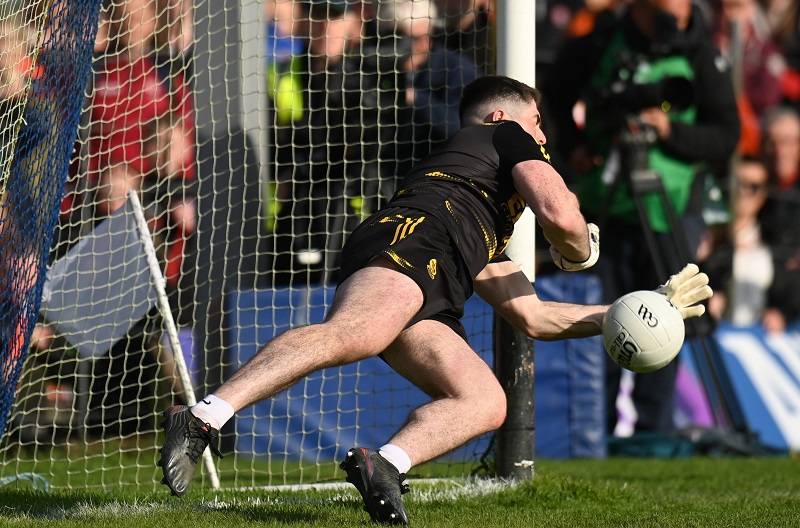By Patrick Morrison
WITH the shortened seasons now in full effect, the GAA have implemented rules to ensure that championship games finish on the same day (except finals). They have instructed teams that if they are level after full time, then extra time will be played to find a winner. This is no new concept in Gaelic games and extra time has indeed been played in the past. But as we have seen over the past few seasons after extra time, games are now being increasingly decided with penalties.
This decision has been met with a very evenly mixed response both for and against its introduction. Most of the feelings of disdain towards this way of settling games comes from the fact that it is seen as being taken from Association Football. It is also seen as a very cruel way to settle a game of football, especially one that has finished level both at full-time and after extra time. Contrary to these beliefs, there is no more Irish way to decide the winning of a game than with a penalty shootout. Why?
In 1890, an Irish businessman and goalkeeper called William McCrum, from the small village of Milford in County Armagh, invented the penalty kick. Up until that point there had been no definitive infringement for fouls that were committed inside of the eighteen-yard square as well as for an intentional handball to stop opponents from scoring. He took his proposal to the Irish FA and they in turn took it to the International FA meeting in 1890 where it was deferred until the next meeting and in 1891 it officially became a law of the game.
To commemorate McCrum and his innovative rule the William McCrum Park was built in Milford village on the site of the pitch where the penalty kick was invented, also with a monument in its centre to honour his achievement.
Last weekend we witnessed the gripping drama of the Ulster final between Derry and my home County Armagh. Derry retained their Ulster title by winning a penalty shootout after full time and extra time could not separate the teams. The drama and the tension were electric and Armagh, the county the penalty kick was devised, were undone by their own invention.
Whether penalty shootouts will be continued to decide championship games can only be debated at this point, but what can be guaranteed is that they are of course a current part of the game as a sanction for infringements committed within the large rectangle. As they are part of the game, they of course need to be trained both by the penalty taker and the goalkeeper facing them. I train penalties in five main ways:
1. Normal Penalties – shooter versus goalkeeper. Shooter takes five penalties and winner and loser is recorded. A league or running score can be kept between the players to add a competitive edge with rewards or forfeits used as motivation
2. Shooter Declares – before the penalty is taken the shooter must declare the spot in which he is intending to put the ball. The goalkeeper starts dead centre on the goal-line and must not move until the shooter strikes the ball. This will benefit both the goalkeeper and the shooter psychologically by both knowing where the ball is going.
3. Slalom Poles – use two slalom poles and place them diagonally from the ground across the post to create a one metre by one metre by one metre triangle. The shooter does not need to declare which side they are shooting for but for the score to count they must score through the triangle created by the slalom poles.4
4. Shooter Declares Slaloms – this is a mixture of options 2 & 3 above. With the slalom poles creating two triangles, the shooter must declare which triangle they are shooting for. The goalkeeper, as before, will be on their goal-line and will not be allowed to move until the shooter has struck the ball.
5. Training Games – during games in training sessions if a goal is scored, for that goal to be counted the goalkeeper on the team that scored the goal must save a penalty at the opposite end. If they save the penalty their team’s goal will count, if they do not save the penalty their goal does not count and is overturned. After the penalty, the game resumes with a restart at the opposite end or end the original goal was scored.
Whatever influences helped Milford FC goalkeeper William McCrum invent the penalty kick does not have any real importance in regard to its application. What really matters is the fact they are part of our Gaelic games (for now) and they need to be worked upon regularly by both shooters and goalkeepers alike. They can be taken for granted at times and they do have a psychological element associated with them. Neglect them at your peril, practice and understanding them will ensure your “Don’t Pay the Penalty!
Email: pmgoalkeeping@hotmail.com
Facebook: @MSoG11
Twitter: @MorSchGk
Receive quality journalism wherever you are, on any device. Keep up to date from the comfort of your own home with a digital subscription.
Any time | Any place | Anywhere












